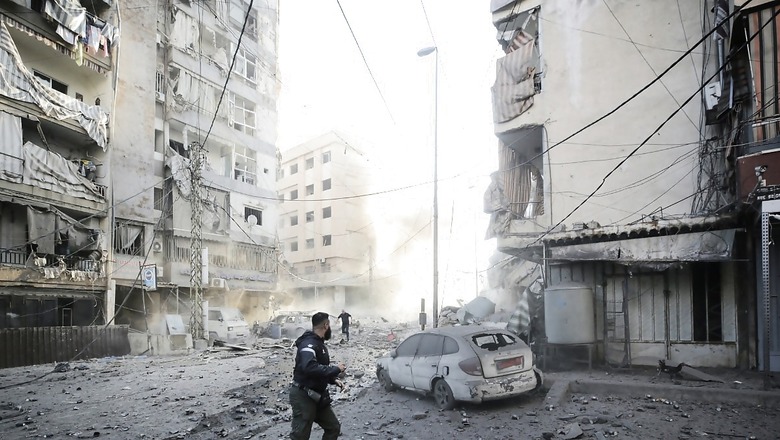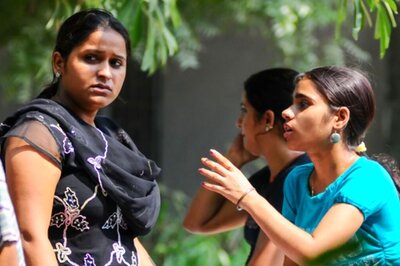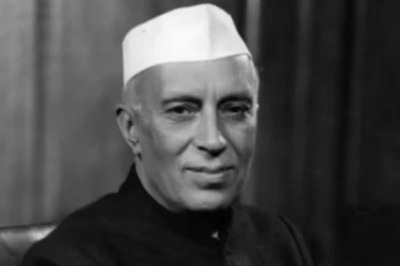
views
Residents near the Israeli-Lebanese border are increasingly fearful of escalating violence as tensions between Israel and Hezbollah continue to rise. Yair Pinhas, a 32-year-old software engineer from Kiryat Shmona, said “There will be a lot of deaths” in the ongoing conflict.
Pinhas grew up in Kiryat Shmona, a town surrounded by Lebanon, and has witnessed the region’s volatility firsthand, CNN reported. His family has been living in a hotel near the Sea of Galilee since they were evacuated following the October 7 terror attacks, which left over 1,200 people dead in southern Israel. The proximity of Shmona to Hezbollah makes it vulnerable to cross-border attacks.
Cycle of retaliation
Over the past year, Hezbollah has launched regular strikes against Israel in support of Hamas, leading to a cycle of retaliation. The Israeli military has responded with cross-border attacks, and tensions have escalated significantly since October 8. Recently, Shmona was struck by a barrage of rockets that caused extensive damage.
Despite the ongoing rocket attacks, Pinhas noted that it was not the threat of rockets that prompted their evacuation but the fear of ground assaults. “We always thought that the October 7 attack would happen here,” he recalled. He described how locals have grown accustomed to seeking shelter during air raid sirens but remain anxious about potential ground incursions by Hezbollah.
Israeli Prime Minister Benjamin Netanyahu has cited the safety of residents like Pinhas as justification for military action against Hezbollah. Speaking at the United Nations General Assembly, he stated that Hezbollah had fired over 8,000 rockets into Israel since October 8 and stressed that Israel would not tolerate such aggression any longer.
IDF Targets Hezbollah
Responding to growing threats, the Israel Defense Forces (IDF) launched airstrikes targeting Hezbollah positions in Beirut and initiated a limited ground operation in southern Lebanon. The IDF aims to prevent further attacks and allow displaced residents to return home safely. However, some residents express concern about the risks associated with military operations in Lebanon.
Ora Hatan, who lives in Shtula overlooking the Lebanese border, warned that entering Lebanon could be perilous due to numerous traps set by Hezbollah. She believes aerial defences are more effective than ground operations. Pinhas echoed these sentiments, acknowledging the need for action against Hezbollah while recognising the potential for significant casualties. “This is very dangerous,” he said. “Hezbollah knows their territory well; this is their playground.”
No peace for peacekeepers
The conflict has already claimed many lives in Lebanon, with reports indicating over 1,400 fatalities since September 17 due to Israeli bombardments. Some 1 million people have been displaced within Lebanon as a result of ongoing hostilities, according to CNN. On Thursday, the UN peacekeeping chief said they are staying in their positions on Lebanon’s southern border despite Israel’s request to vacate some areas before it launched its ground operation against Hezbollah militants.
Jean-Pierre Lacroix said the commander and liaison officers from the U.N. force, known as UNIFIL, also are in constant contact with their counterparts in the Israeli and Lebanese militaries. He called that key to protecting the U.N.’s more than 10,000 peacekeepers. The UN force is “the only channel of communications between the parties,” he told reporters. “The peacekeepers are also working with partners to do what they can to protect the population.”
UNIFIL was created to oversee the withdrawal of Israeli troops from southern Lebanon after Israel’s 1978 invasion. The UN expanded its mission following the 2006 war between Israel and Hezbollah, allowing peacekeepers to deploy along the Israeli border. Lacroix, who is undersecretary-general for peace operations, said UNIFIL had anticipated “a limited, targeted ground operation” and had thoroughly discussed whether U.N. peacekeepers should stay or not, deciding they should stay for now.
“We’re constantly reviewing the situation” on the ground in terms of the safety and security of the peacekeepers, he said. He added that contingency plans are ready but refused to discuss them. Lacroix also stressed that Israel and Hezbollah have an obligation to protect the UN peacekeepers.
(With agency inputs)




















Comments
0 comment